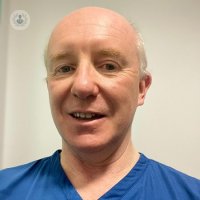St Mary’s Hospital Cardiac Care Unit and Services Offered
Autore:Highly-experienced consultant cardiologist Dr Mark Connaughton practises at St Mary’s Hospital Cardiac Care Unit, which he has provided us information on what it is, what services are offered there, and basic cardiac testing information the public should know.

What type of cardiology services are available at St Mary's Hospital, Isle of Wight?
The cardiology department at St Mary’s runs a complete non-invasive cardiac diagnostic service. Services include 12 lead ECGs, 24hr and extended ambulatory ECGs (Holters), and ambulatory blood pressure monitors. There are facilities for interrogation and programming of most makes of pacemaker and implanted defibrillator device.
What heart conditions should people be checking?
Someone with no history of cardiac problems should have their blood pressure and blood cholesterol level checked at some point as a baseline. If an individual has reason to suspect they may be at risk of premature coronary artery disease, then it would be reasonable to request an ECG from their general practitioner (GP). If they are otherwise active and have no symptoms suggestive of cardiac problems, it is unlikely anything else is required.
Who should have cardiology tests done and how often?
Individuals with a history of cardiac disease should in any case be offered an annual check up by their GP. This will normally include a clinical assessment, blood pressure measurement, an ECG, and a cholesterol test.
Individuals with cardiac valve problems may be under routine surveillance with an echocardiogram, often at annual intervals, but sometimes at intervals of three or six months, depending on how things may be changing.
If heart failure is the main problem, then again an annual echocardiogram will often be arranged.
Cardiac CT is now often used as a screen for underlying coronary artery disease, and for some structural problems, such as abnormal expansion of the first part of the aorta. Some patients require repeated scans on an annual or 2-yearly basis.
Cardiac magnetic resonance studies (MRI) can be extremely useful in investigating congenital or structural heart problems, complex issues with coronary artery disease and blood supply, and some forms of heart failure or cardiac muscle problem. Repeated MRI scans are required only rarely.
What is The Coronary Care Unit and what is it used for?
The Coronary Care Unit or CCU was historically the specialist area for treating heart attacks. Our CCU is now a focused cardiac ward, bringing together all the professions involved in treating acute cardiac problems requiring inpatient care. These include specialist cardiac nurses, junior doctors and consultant cardiologists, physician associates, physiotherapists, occupational therapists, and cardiac physiologists. At any one time a variety of conditions may be being treated. This will nearly always include patients with acute coronary events and decompensated heart failure, but often patients with significant valve problems, with acute rhythm problems, and rarer conditions such as a cardiomyopathy or endocardities. The CCU is one of the few areas in the hospital which can offer continuous monitoring of cardiac rhythm and can provide more detailed physiological monitoring of the sickest patients. Patients requiring non-invasive ventilation for cardiac or respiratory problems, including Covid-19, can also be managed here.
Permanent pacemaker implants are managed via the CCU, with the implants being done in an adjacent dedicated pacing theatre. Day case procedures requiring sedation or a general anaesthetic, such as cardioversion will also be admitted to the CCU.
What type of outpatient clinics are there and who are they for?
The bulk of outpatient work is in general cardiology for patients referred via GPs. These clinics are generally segregated into new patient clinics and follow-up clinics. The follow-up clinics will include some patients previously seen as inpatients. In particular, these clinics now follow-up nearly all patients after any form of cardiac surgery, and they are no longer seen after discharge from hospital by their original surgical team.
GPs may refer anyone they think requires a specialist cardiac assessment, including coronary artery problems, heart failure, rhythm problems, valve problems, and any issues arising from previous treatments, surgery, or device implantation. More specialist Rapid Access clinics are run for patients with recent onset chest pain, and for possible heart failure. Complex heart failure has its own clinic.
Nurse-run clinics include those directed at community heart failure, and cardiac rehabilitation.
Who are the cardiac rehabilitation services available for?
Local cardiac rehabilitation services are there for anyone who has sustained a heart attack, or who has had some form of cardiac surgery or other cardiac procedure such as coronary stenting. Patients are frequently referred to the service from large centres which have performed the surgery or other procedure.
If you are concerned about your heart health or would like more information, you can go to Dr Connaughton's profile and schedule a consultation.


